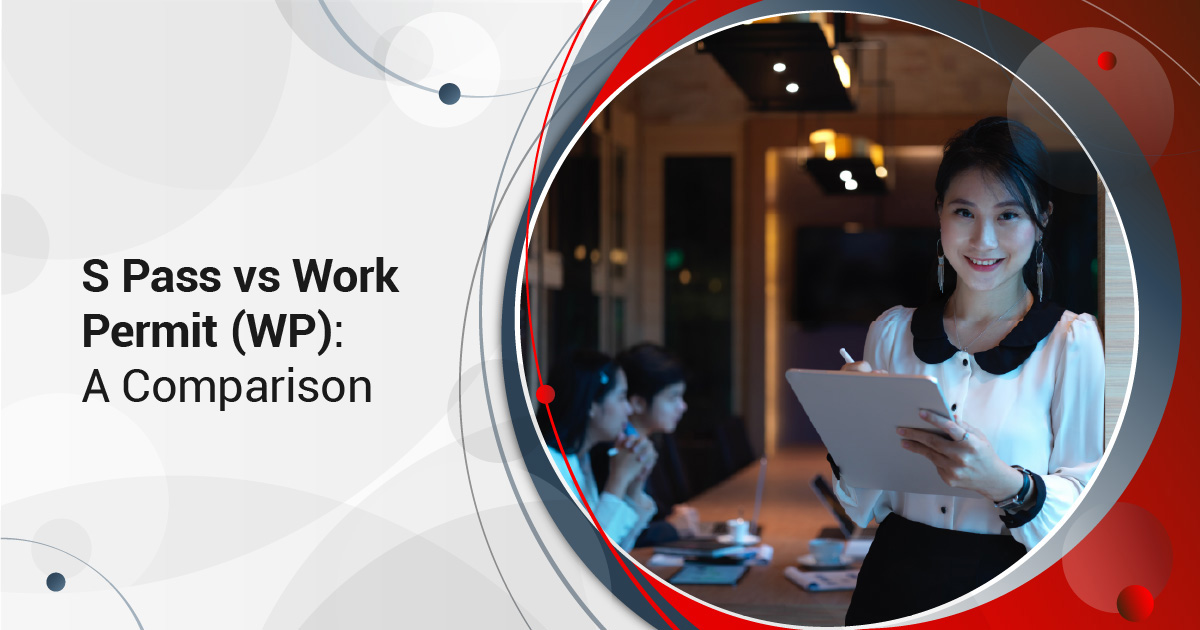Navigating Singapore’s foreign manpower policies requires a clear understanding of the different work passes available. For employers looking to hire mid-skilled technicians or basic-skilled workers, the decision often comes down to two options: the S Pass and the Work Permit.
While both serve to fill crucial gaps in the local workforce, they cater to different skill levels, industries, and come with distinct eligibility criteria and obligations for employers. Choosing the correct work pass directly impacts your company’s operational costs, workforce planning, and ability to secure the right talent.
This guide provides a detailed comparison of the S Pass and the Work Permit, covering salary requirements, levies, quotas, and application processes to help you make an informed decision for your business.
Key Takeaways
- An S Pass is designed for mid-skilled professionals with technical skills, diplomas, or relevant work experience, while a WP is for semi-skilled or unskilled workers from approved source countries, typically employed in industries like construction, manufacturing, and services.
- Employers should hire S Pass holders for supervisory or technical roles requiring qualifications and experience.
- On the other hand, they should opt for Work Permit holders for manual or operational roles in specific industries.
- Business owners should evaluate quotas, levies, and long-term talent strategies to align with business needs.
S Pass vs Work Permit: Understanding the Core Differences

At a fundamental level, the distinction between the S Pass and the Work Permit is based on the skill level of the foreign employee.
- S Pass: This pass is designed for mid-skilled foreign professionals. These individuals typically possess technical skills, diplomas, or relevant work experience. They occupy roles such as technicians, specialists, or junior executives.
- Work Permit: This pass is intended for semi-skilled or unskilled workers from approved source countries. These workers are commonly employed in sectors like construction, manufacturing, marine shipyard, and services.
This core difference influences every other aspect of the pass, from minimum salary thresholds to the medical insurance coverage employers must provide.
Eligibility Criteria: A Detailed Comparison
The Ministry of Manpower (MOM) sets specific criteria for both employers and potential pass holders. Meeting these requirements is the first and most critical step in the application process.
S Pass Eligibility
To qualify for an S Pass, a candidate must meet specific salary benchmarks.
- Minimum Salary: The qualifying salary for S Pass candidates is benchmarked against the earnings of local Associate Professionals and Technicians. As of September 2025, the minimum qualifying salary for new applicants is S$3,300, which increases with age. For the financial services sector, the minimum is higher, at S$3,800. These thresholds are reviewed periodically by MOM.
- Educational Qualifications: Candidates generally need a degree, diploma, or specialised technical certificate, although declaration is optional. The qualification should typically require at least one year of full-time study.
- Relevant Work Experience: Years of professional experience can be a strong supporting factor, especially if the educational qualifications are not from premier institutions.
The candidate should also have a job offer in Singapore.
Employers must also be aware of the Fair Consideration Framework (FCF), which requires them to advertise job vacancies on the MyCareersFuture portal and fairly consider all candidates before applying for an S Pass.
Related Read: Understanding the Fair Consideration Framework for Work Pass Application.
Work Permit (WP) Eligibility
Work Permit eligibility is more restrictive and largely dependent on the worker’s nationality and the industry sector.
- Source Countries: Workers must come from a pre-approved list of countries, which varies by sector. For example, the construction sector can source workers from Malaysia, China, India, and other specific Asian countries. The service sector has a more limited list, primarily focused on Malaysian workers.
- Age and Educational Requirements: Applicants must generally be between 18 and 61 years old. While there are no minimum salary requirements set by MOM, specific educational qualifications may be needed depending on the source country and industry.
- Sector-Specific Rules: Each industry has unique rules. For instance, workers in the construction sector must possess specific trade skills and safety certifications relevant to their job scope.
Related Read: A Complete Guide to the Work Permit Renewal Process in Singapore.
Quotas and Levies: The Financial Impact on Employers
The most significant financial considerations for employers are the Dependency Ratio Ceiling (DRC), commonly known as the quota, and the monthly foreign worker levy.
S Pass Quota and Levy
- Quota: The number of S Pass holders a company can hire is limited by a quota. In the services sector, S Pass holders can constitute up to 10% of the company’s total workforce. For all other sectors, the quota is 15%.
- Levy: A monthly levy is payable for each S Pass holder. As of 1 September 2025, the levy has been standardised to S$650 across all sectors and levy tiers. For S Pass workers who did not work for a full calendar month, the daily levy rate is S$21.37.
Work Permit Quota and Levy

The quota and levy system for Work Permits is more complex and varies significantly by industry.
- Quota (DRC): The DRC for Work Permit holders is much higher than for S Pass holders, reflecting the industries they work in.
- Construction: 5 WP holders for every local employee earning the Local Qualifying Salary
- Manufacturing: 60%
- Services: 35%
- Marine Shipyard: 3.5 WP holders for every local employee earning the LQS
- Process: 5 WP holders for every local employee earning the LQS
- Levy: The levy rates are tiered based on the worker’s skill level (basic-skilled and higher-skilled) and source country (NTS, NAS, Malaysia, PRC). For sectors such as manufacturing and services, employers pay less levy for higher-skilled migrant workers.
Employers should use MOM’s online calculators to determine their specific quota and levy obligations accurately.
Key Obligations for Employers
Beyond quotas and levies, employers have distinct responsibilities for each pass type.
| Obligation | S Pass Holder | Work Permit Holder |
|---|---|---|
| Medical Insurance | Must provide medical insurance with at least S$60,000 annual coverage. | Must provide medical insurance with at least S$60,000 annual coverage. |
| Security Bond | Not required. | A S$5,000 security bond is required for each non-Malaysian worker. |
| Accommodation | Not responsible for providing accommodation. | Responsible for providing safe and acceptable accommodation. |
| Bringing Dependants | Can apply for Dependant’s Pass for spouse and children if earning at least S$6,000/month. | Not allowed to bring dependents to Singapore. |
| Path to PR | Eligible to apply for Singapore Permanent Residence. | Not eligible to apply for Singapore Permanent Residence. |
Choosing the Right Pass for Your Business

The decision between an S Pass and a Work Permit should be guided by your specific business needs and the nature of the role you need to fill.
- Assess the Job Role and Skill Requirements:
- Is the role supervisory, technical, or specialized? If it requires a diploma and relevant experience, the S Pass is the appropriate choice.
- Is the role manual, operational, or in a trade that requires basic skills? If so, and the candidate is from an approved source country, the Work Permit is the correct path.
- Evaluate Your Manpower Quota:
- Check your company’s current workforce profile to determine your available S Pass and Work Permit quotas. If you have a limited S Pass quota, you may need to prioritise hiring locals for mid-skilled roles.
- Calculate the Total Cost of Hiring:
- Factor in not just the salary but also the monthly levy, medical insurance, and, for Work Permit holders, the security bond and accommodation costs. The S Pass often involves a higher salary but fewer ancillary costs compared to a Work Permit.
- Consider Long-Term Talent Strategy:
- S Pass holders offer a path to greater integration into Singapore’s society and workforce, with the potential for permanent residency. This can be a key factor for retaining valuable mid-skilled talent. Work Permit holders, by contrast, are generally seen as a transient workforce for specific sectors.
A Strategic Decision to Make
The S Pass and Work Permit are integral components of Singapore’s foreign talent framework, each designed for a distinct purpose. The S Pass caters to the need for mid-level technical expertise, offering a pathway for long-term integration. The Work Permit addresses the demand for labor in essential sectors like construction and manufacturing, with stricter controls on source countries and worker welfare.
For employers, making the right choice requires a careful evaluation of the job requirements, financial implications, and your company’s long-term human resource strategy. By understanding the nuances of each pass, you can ensure compliance with MOM regulations, manage costs effectively, and build a capable and balanced workforce that supports your business growth in Singapore.
Partnering with a reliable immigration specialist in Singapore can be helpful when employing your workers. Contact InCorp now to find out how our experienced team can help!
FAQs about S Pass vs Work Permit (WP)
What are the disadvantages of S Pass in Singapore?
- Employers are restricted by the DRC, which limits the number of S Pass holders a company can hire. This can make it challenging for businesses with a high demand for mid-skilled foreign workers. Employers must also pay a monthly levy for each S Pass holder, which is currently S$650 per worker. This adds to the overall cost of hiring foreign talent.
Can a work permit upgrade to a S Pass?
- Yes, but the transition depends on meeting the eligibility criteria for the S Pass and the employer's ability to secure the pass for the worker.
Is a S Pass considered an employment pass?
- No, the S Pass is not considered an Employment Pass (EP) in Singapore. While both are work passes issued by MOM, they cater to different categories of foreign workers and have distinct eligibility criteria, salary requirements, and purposes.


